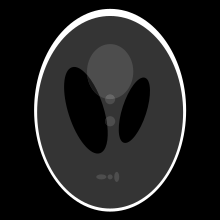Shepp-Logan-Phantom
Zur Navigation springen
Zur Suche springen

Das Shepp-Logan-Phantom ist ein standardisiertes Testbild, das von Larry Shepp und Benjamin F. Logan für ihre 1974 veröffentlichte Arbeit The Fourier Reconstruction of a Head Section erstellt wurde.[1] Es dient als Modell eines menschlichen Kopfes für die Entwicklung und Prüfung von Bildrekonstruktionsalgorithmen.[2][3][4]
Definition
[Bearbeiten | Quelltext bearbeiten]Die Funktion, die das Phantom beschreibt, ist definiert[1] als die Summe von 10 Ellipsen innerhalb eines Quadrats:
| Ellipse | Mittelpunkt | Hauptachse | Nebenachse | Theta | Grauwert |
|---|---|---|---|---|---|
| a | (0,0) | 0.69 | 0.92 | 0 | 2 |
| b | (0,−0.0184) | 0.6624 | 0.874 | 0 | −0.98 |
| c | (0.22,0) | 0.11 | 0.31 | −18° | −0.02 |
| d | (−0.22,0) | 0.16 | 0.41 | 18° | −0.02 |
| e | (0,0.35) | 0.21 | 0.25 | 0 | 0.01 |
| f | (0,0.1) | 0.046 | 0.046 | 0 | 0.01 |
| g | (0,−0.1) | 0.046 | 0.046 | 0 | 0.01 |
| h | (−0.08,−0.605) | 0.046 | 0.023 | 0 | 0.01 |
| i | (0,−0.605) | 0.023 | 0.023 | 0 | 0.01 |
| j | (0.06,−0.605) | 0.023 | 0.046 | 0 | 0.01 |
Weblinks
[Bearbeiten | Quelltext bearbeiten]Commons: Shepp-Logan-Phantom – Sammlung von Bildern, Videos und Audiodateien
Einzelnachweise
[Bearbeiten | Quelltext bearbeiten]- ↑ a b Larry A. Shepp, Benjamin F. Logan: The Fourier Reconstruction of a Head Section. In: IEEE Transactions on Nuclear Science. NS-21. Jahrgang, Nr. 3, Juni 1974, S. 21–43, doi:10.1109/TNS.1974.6499235, bibcode:1974ITNS...21...21A (englisch, stat.wharton.upenn.edu ( des vom 4. März 2016 im Internet Archive)).
- ↑ Jordan Ellenberg: Fill in the Blanks: Using Math to Turn Lo-Res Datasets Into Hi-Res Samples In: Wired, 22. Februar 2010. Abgerufen am 31. Mai 2013 (englisch).
- ↑ Jennifer L. Müller, Samuli Siltanen: Linear and Nonlinear Inverse Problems with Practical Applications. SIAM, 2012, ISBN 978-1-61197-233-7, S. 31– (englisch, google.com [abgerufen am 31. Mai 2013]).
- ↑ Cheng Guan Koay, Joelle E. Sarlls, Evren Özarslan: Three-Dimensional Analytical Magnetic Resonance Imaging Phantom in the Fourier Domain ( des vom 16. Februar 2013 im Internet Archive) In: Magnetic Resonance in Medicine, S. 430–436 (englisch).
